

Was Karl Marx always wrong? 10 December 2013 Was Karl Marx Always Wrong?
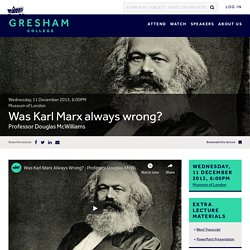
Professor Douglas McWilliams It doesn’t seem long since my last lecture. Human Rights: Developments. 03 December 2014 Human Rights: Developments Professor Sir Geoffrey Nice QC.
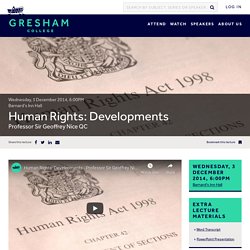
Divorce law - a disaster? Divorce Law - A Disaster?
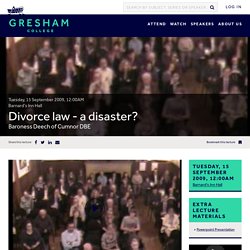
The Baroness Deech of Cumnor DBE My series of lectures on family law this year will have two interlocking themes. Fertility and Feminism. Professor the Baroness Deech DBE It is almost too simple to point out that most of the users of reproductive medicine are women, and the providers men.
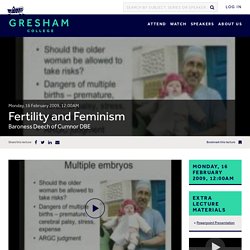
Early on in my chairmanship of the HFEA, I heard a respected doctor comment that he had made 1000 women pregnant! Women appear on the scene as grateful patients, nurses, counsellors, members of Ethics Committees and quite often as scientists. There is a great deal of money to be made out of successful IVF, but not by the women. They have one invaluable commodity, however, and that is their eggs, especially in demand now for stem cell research. There are some interesting feminist questions which I will just pose, but cannot answer this evening whether for lack of time or theory. Queer Presences and Absences: Citizenship, Community, Diversity - or Death. 28 November 2011 Queer Presences and Absences:Citizenship, Community, Diversity or Death Dr Yvette Taylor In this paper I’m going to consider moments of US and UK sexual citizenship, situating this in terms of LGBT campaigning groups’ actions, institutional reactions and broader public relations, to make links between citizenship, community, diversity – and death.
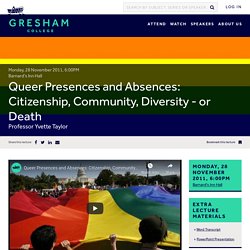
Reactions to and demands from LGBT presence and activism often work to re-create a dominant ‘we’, while the rhetorics of ‘diversity’ and ‘community’ are strategically deployed – implying inclusivity while exercising exclusion. Recent policies in the US and UK context – such as the Civil Partnership Act (2004) and the repeal of US military policy ‘Don’t Ask, Don’t Tell’ – have been conceptualised as key moments of coming forward, whereby LGBT citizens have gained new public visibility and viable presence within a human rights framework. Much campaigning has now occurred inside and outside of Rutgers. Ideological weddings: something old, something new, something borrowed, something blue.
Professor Rodney Barker New rights and new lefts in Britain as both the chronological and the short twentieth centuries draw to a close.
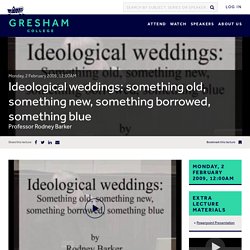
How new is new, how left is left, and how right is right? Is there genuine innovation, or just a rearrangement of old arguments? Weddings can sometimes leave the ordinary member of the wedding party a bit baffled: "What on earth is SHE doing marrying HIM? " "Do her family realise what they're letting themselves in for? " "Have you seen that uncle over there? "I'll be VERY surprised if it lasts the year. " There's something of that rather surprising "how can it ever work" mix in the two ideological clusters I'm going to talk about this evening, the New Left and the New Right, phenomena of political writing and argument in Britain from the mid-1950s to the 1980s of the last century. But they're not unusual in being a sometimes odd mixture. Who hates globalisation? Who hates globalisation?
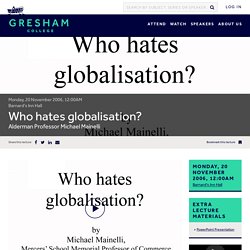
Professor Michael Mainelli Good evening Ladies and Gentlemen. It’s my privilege to welcome you to Gresham College tonight. For those of you who don’t know me I’m Michael Mainelli, the Mercers’ School Memorial Professor of Commerce. With so many things to do around the world, I’m pleased you chose Globalisation and NGOs tonight. Well, as we say in Commerce – “To Business”. Horton Hears A Who! Apprenticeship: Politics, Education, or Reality Television? Ladies and Gentlemen.

I am delighted to see so many of you here today, I’ve been told that this lecture “sold out” (which is quite surprising as tickets are free) at a record pace and left some disappointed- let’s hope you’re not amongst them in an hour’s time. Who knew that my northern drawl would appeal to so many? Who am I kidding?
It’s not me you are here to see. I know you have come to hear the fascinating history of Apprenticeships. The Liberal Party and the Liberal Democrats. Vernon Bogdanor CBE is Emeritus Gresham Professor of Law, current Visiting Gresham Professor of Political History, Research Professor at King's College London, a Fellow of the British Academy and an Honorary Fellow of the Institute of Advanced Legal Studies.
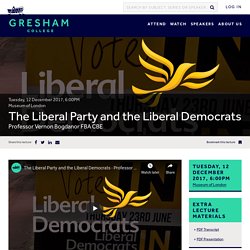
Prior to 2010, Professor Bogdanor was a Fellow of Brasenose College and Professor of Government at Oxford University. He has been an adviser to a number of governments, including those of the Czech Republic, Hungary, Kosovo, Israel and Slovakia. His books include The People and the Party System, Multi-Party Politics and the Constitution, Power and the People, and Devolution in the United Kingdom. He is a frequent contributor to TV, radio and the press and is a sometimes special advisor to the House of Lords Select Committee on the European Communities (1982-83), and the House of Commons Public Service Committee. Professor Bogdanor's previous lecture series are as follows: The Conservative Party. Vernon Bogdanor CBE is Emeritus Gresham Professor of Law, current Visiting Gresham Professor of Political History, Research Professor at King's College London, a Fellow of the British Academy and an Honorary Fellow of the Institute of Advanced Legal Studies.
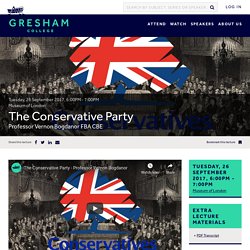
Prior to 2010, Professor Bogdanor was a Fellow of Brasenose College and Professor of Government at Oxford University. He has been an adviser to a number of governments, including those of the Czech Republic, Hungary, Kosovo, Israel and Slovakia. His books include The People and the Party System, Multi-Party Politics and the Constitution, Power and the People, and Devolution in the United Kingdom. He is a frequent contributor to TV, radio and the press and is a sometimes special advisor to the House of Lords Select Committee on the European Communities (1982-83), and the House of Commons Public Service Committee. Professor Bogdanor's previous lecture series are as follows: The Labour Party. Introduction to Catastrophe Theory and its Application to Physics and Sociology. Part One: Critiquing Corruption and Corruption in Britain.
[vii] For more information on the Bribery Act 2010 and its implications for the Square Mile, see Avoiding Corruption Risks in the City: The Bribery Act 2010, prepared by Transparency International in May 2010 for the City of London Corporation. Critiquing Corruption - Analytical Frameworks, Professor Michael Mainelli Good afternoon Ladies and Gentlemen. Today we explore corruption, and by way of opening I'd like to share with you some thoughts over the next 20 minutes about the frameworks we might use for analysing corruption.
This symposium grew out of the positive response to an October 2007 lecture I gave, 'What I like about this country is that it has a nice level of corruption! '. The inspiration for that talk came to us courtesy of a friend, Dr Malcolm Cooper. As with so many discussions, it is traditional, and important, to begin by setting out our terms. So, in short, corruption is - 'the abuse of entrusted power for private gain'. Ethics. Biology and ecology. Sociology. Politics. War and Truth: Conflict, Security and the Media. Robert Fox It is a portentous title, isn't it, 'War and Truth'? I can't claim copyright - it was invented by Peter Hennessey, so blame him! I would like to begin with a word of thanks and warning: I am honoured to be the fourth Peter Nailor lecturer in defence in this series, which was opened by Sir Kevin Tebbit in 2001, followed two years later by Admiral Lord Boyce, and two years ago, by Sir David Omand.
Brexit and the Future of Britain. Vernon Bogdanor CBE is Emeritus Gresham Professor of Law, current Visiting Gresham Professor of Political History, Research Professor at King's College London, a Fellow of the British Academy and an Honorary Fellow of the Institute of Advanced Legal Studies. Prior to 2010, Professor Bogdanor was a Fellow of Brasenose College and Professor of Government at Oxford University. He has been an adviser to a number of governments, including those of the Czech Republic, Hungary, Kosovo, Israel and Slovakia. His books include The People and the Party System, Multi-Party Politics and the Constitution, Power and the People, and Devolution in the United Kingdom.
He is a frequent contributor to TV, radio and the press and is a sometimes special advisor to the House of Lords Select Committee on the European Communities (1982-83), and the House of Commons Public Service Committee. Professor Bogdanor's previous lecture series are as follows: Local or global? Network economics and the new economy. Local Or Global? Network Economics And The New Economy Professor Michael Mainelli Good evening Ladies and Gentlemen. Tonight we explore "the near and the far".